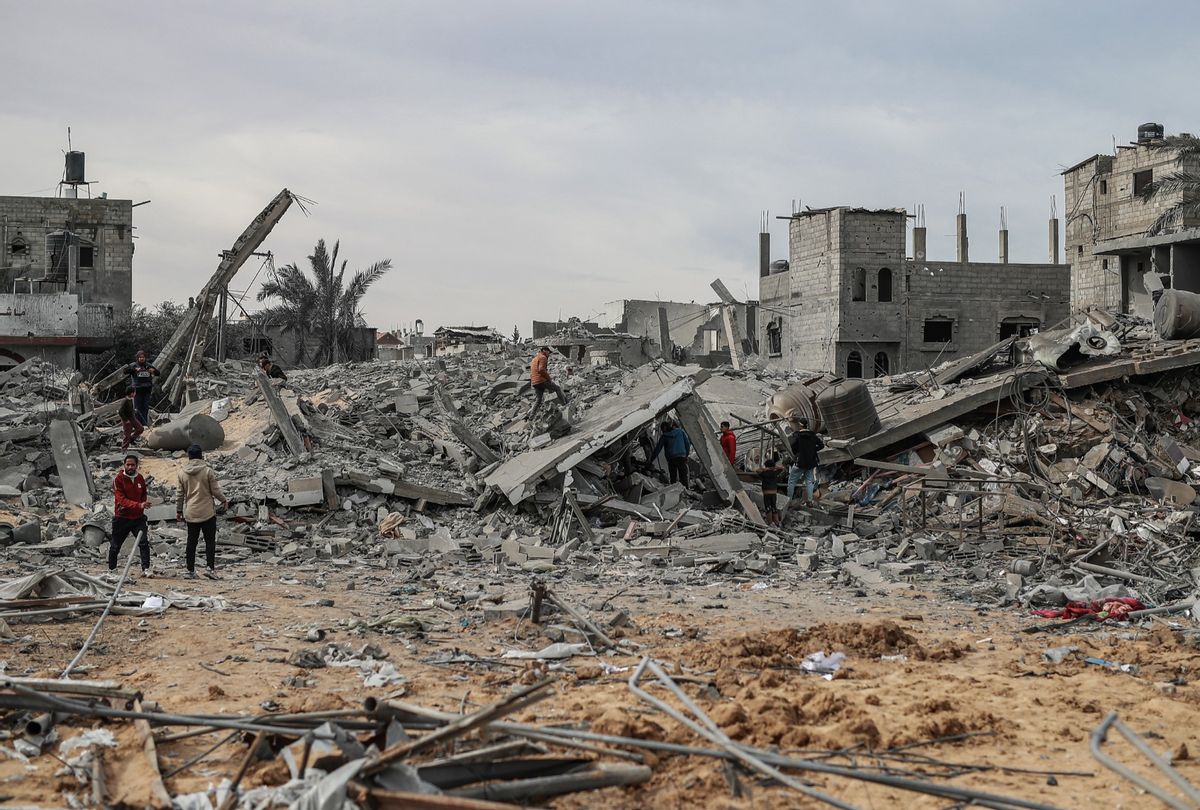Israeli forces raided an apartment building in the besieged and overcrowded Gaza city of Rafah early Monday and rescued two hostages in an operation that killed dozens of Palestinians, including children.
The freed hostages were later identified as 61-year-old Fernando Simon Marman and 70-year-old Louis Har. A spokesperson for the Israel Defense Forces (IDF) said that both were in good medical condition. The Associated Press reported that "heavy airstrikes that provided cover for the operation killed at least 67 Palestinians."
The operation marked just the second time in more than four months of war that the IDF managed to rescue people taken captive during the Hamas-led attack on southern Israel in early October. Since then, Israel's military has killed more than 28,000 people in the Gaza Strip, including several Israeli hostages.
More than 100 hostages are still being held in Gaza, according to Israeli authorities.
The IDF launched a wave of airstrikes on Rafah during Monday's operation, heightening concerns for the city's trapped and terrified civilian population. Around 1.4 million people are believed to be in the city, most of them having sought refuge there during Israel's assault on other parts of the Gaza Strip.
"Can anyone tell us where to go so we don't die? So our limbs aren't torn apart? So I don't lose anyone?" said one mother in Rafah as the city came under attack. "Where do we go, tell me? Someone answer me and tell me where to go."
On Friday, ahead of an expected ground assault on Rafah, Israeli Prime Minister Benjamin Netanyahu instructed the IDF to craft a plan to forcibly "evacuate" civilians from the city, which is located on Gaza's border with Egypt. Reuters reported that Egypt has "sent about 40 tanks and armored personnel carriers to northeastern Sinai within the past two weeks as part of a series of measures to bolster" its border with Gaza.
Meinie Nicolai, director-general of Médecins Sans Frontières, said in a statement Monday that "Israel's declared ground offensive on Rafah would be catastrophic and must not proceed."
"As aerial bombardment of the area continues, more than a million people, many living in tents and makeshift shelters, now face a dramatic escalation in this ongoing massacre," said Nicolai. "Nowhere in Gaza is safe, and repeated forced displacements have pushed people to Rafah, where they are trapped in a tiny patch of land and have no options."
"The needs are overwhelming, and the situation requires a safe humanitarian response at a much larger scale," Nicolai continued. "We call on the government of Israel to immediately halt this offensive, and to all supporting governments including the United States, to take concrete action to bring about a complete and sustained cease-fire."
Last week, Netanyahu rejected a Hamas proposal that called for a four-and-a-half month cease-fire and the release of Israeli hostages as well as Palestinians held in Israel. A week-long pause in November led to the release of more than 100 hostages.
Following Monday's operation, Netanyahu signaled that Israel's military assault on Gaza will continue, even as the country faces genocide charges on the world stage and growing internal skepticism over the government's approach, which has created one of the worst humanitarian catastrophes in modern history.
"Fernando and Louis, welcome home," Netanyahu said in a statement. "I salute our brave fighters for the daring action that led to their release. Only continued military pressure, until total victory, will bring the release of all our hostages. We will not miss any opportunity to bring them home."
Speaking anonymously to The New York Times last month, senior Israeli military leaders argued that "the dual objectives of freeing the hostages and destroying Hamas are now mutually incompatible."
"A drawn-out battle intended to fully dismantle Hamas would most likely cost the lives of the Israeli hostages held in Gaza," the military leaders said, according to the Times. "Most of the remaining hostages are thought to be held by Hamas cells that are hiding within the subterranean fortress of tunnels that extends for hundreds of miles beneath the surface of Gaza."
The Wall Street Journal recently reported that U.S. and Israeli officials believe that up to 80% of Hamas' tunnels remain intact after months of relentless Israeli bombing. One aid group has estimated that around 90% of those killed in Israeli airstrikes since October 7 were civilians.
In a call with Netanyahu on Sunday ahead of the Israeli military's latest round of bombing, U.S. President Joe Biden "reaffirmed his view that a military operation in Rafah should not proceed without a credible and executable plan for ensuring the safety of and support for the more than one million people sheltering there," according to a White House readout.
Trita Parsi, executive vice president of the Quincy Institute for Responsible Statecraft, wrote late Sunday that "as usual, Netanyahu ignored Biden's meek requests since they're not backed up with real pressure."
"How many more civilians will have to die, how much more regional escalation will have to occur, before Biden gets serious?" Parsi asked.



Shares